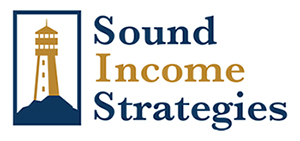There are some non-traditional ways to generate income in retirement portfolios.
In this piece you can build your case for:
- Investors want to hear how investment grade and high yield bonds can be higher-paying
- The potential benefits of dividend-paying stocks
- The potential benefits of using ETFs in a retirement portfolio
See how the Sound Income Strategies ETFs may work well in your clients’ retirement portfolios.
SDEI – The Sound Equity Income ETF (SDEI) is an actively managed exchange-traded fund (ETF). SDEI’s primary objective is to generate current income via a dividend yield that is targeted to be at least two times that of the S&P 500 Index.
SDEF – The Sound Enhanced Fixed Income ETF (SDEF) is an actively managed exchange-traded fund (ETF) that seeks current income while providing the opportunity for capital appreciation by investing in fixed income securities.
IMPORTANT INFORMATION
Before investing you should carefully consider the Fund’s investment objectives, risks, charges and expenses. This and other information is in the prospectus. A prospectus may be obtained by calling (833) 916-9056 or visiting www.soundetfs.com. Please read the prospectus carefully before you invest.
Investing involves risk, including the potential loss of principal. There is no guarantee that the Funds investment strategy will be successful. Shares may trade at a premium or discount to their NAV in the secondary market. The Fund is new and has a limited operating history. The Fund has a limited number of financial institutions that are authorized to purchase and redeem shares directly from the Fund and there may be a limited number of market makers or other liquidity providers in the marketplace.
Securities rated below investment-grade are often referred to as high-yield securities or “junk bonds.” Investments in lower-rated corporate debt securities typically entail greater price volatility and principal & income risk. High-yield securities may be more susceptible to real or perceived adverse economic and competitive industry conditions than investment-grade securities.
The Fund’s investments in bonds and other debt securities will change in value based on changes in interest rates. If rates rise, the value of these investments generally declines. Securities with greater interest rate sensitivity and longer maturities generally are subject to greater fluctuations in value. The Fund is considered to be non-diversified, which means that it may invest more of its assets in the securities of a single issuer or a smaller number of issuers than if it were a diversified fund.
The Fund is distributed by Foreside Fund Services, LLC.

